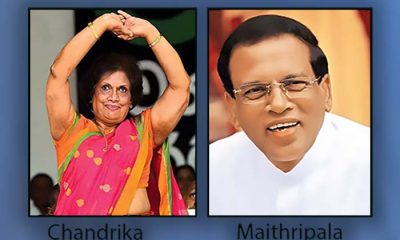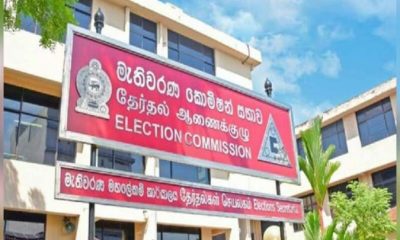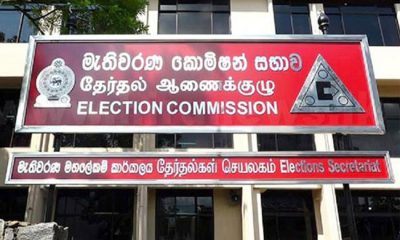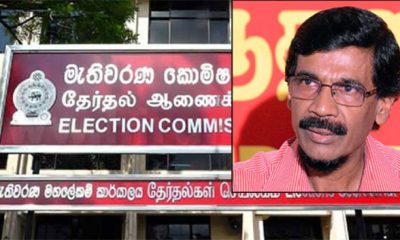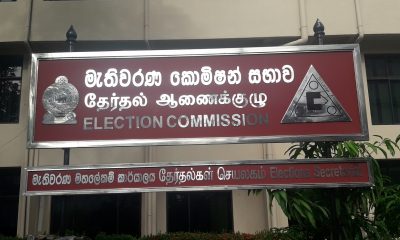Features
Electoral process also an essential service

By Jehan Perera
The local government elections are unlikely to take place as scheduled on March 9. This is on account of the government printer declining to print ballot papers without prior payment by the Election Commission. The Election Commission is on record saying that due to this delay in the printing of ballot papers, and the difficulty of completing the postal voting on time, the elections may need to be postponed. This unexpected turn of events throw the country’s democratic process into jeopardy. It follows a government decision not to permit credit purchases by government departments. A long prevalent practice of the government printer undertaking the printing of ballot papers without payment in advance has been put into abeyance.
The problem is an absurd one as it is an internal issue between two state institutions both of which are funded by decisions of the government. It reflects the reluctance of the government to go to the polls at this time. The local government elections have come to be widely seen as a referendum on the popularity of the government and its legitimacy. The Supreme Court will be taking up the second of the two cases brought before it regarding the elections this week. It has given its decision in the first of the cases in which it stated there was no need for it to intervene as the Election Commission was vested with the power to declare the date of elections and had done so.
However, the court did not take up the second case due to defects in the petition and postponed the hearing to February 23 to enable them to be corrected. In this case the petitioner had argued that the prevailing economic situation in the country is not conducive to the holding of the local government elections. This corresponds to the position taken by government leaders that their priority is to revive the national economy and maintain political stability that is necessary for this purpose. The cost of the elections is estimated to be in the region of Rs 10 billion. The government has made provision for this sum in the national budget for the year. However, it now claims that it has no funds at its disposal to put into the elections although it has made provision for it in the budget.
REPEAT PROTESTS
The government treasury has explained its predicament as arising from a government decision to prioritise five areas for the utilisation of government funds. The Treasury Secretary has explained that due to the ongoing economic crisis the government has decided that funds should only be utilised for essential services. Such services have been itemised and do not include expenses for the conduct of local elections. These are the purchase of paddy from farmers, provision of nutrition to malnourished children and pregnant mothers, gratuity payments and outstanding bills from the decentralided budget programme. If expenses were to be met from outside the list of items, special approval has to be obtained. The conduct of timely elections, which forms the base of the democratic system, needs to be considered to be an essential service.
If elections are not held or if a new date is not set for the elections, there is bound to be political instability. The Bar Association has warned “the conduct of the Secretary to the Treasury, the Government Printer, and other government officials and institutions over the last few weeks clearly demonstrates a concerted effort to bring the elections to a halt, thus undermining the franchise of the people and endangering the sovereignty of the people of Sri Lanka. Such attempts to prevent elections mandated by law represent an unprecedented attack on democracy and the rule of law and pose a grave threat to the electoral process in the future. The BASL warns that such actions could set a dangerous precedent for an unpopular executive or legislature to obstruct the allocation of resources for an election and prevent the people of Sri Lanka from electing their representatives and leaders.”
In this context, the failure to hold the elections can provoke public protests by opposition political parties and direct action by the wider protest movement that escalates into the situation seen last year. Sri Lanka has had two negative experiences of governments having postponed elections which have come back to haunt the country. The first was the extension of the life of the parliament elected in 1970 with the government using its 2/3 majority in parliament in 1972 to put in place a new constitution that gave the government two extra years until 1977. The second was the extension of the life of parliament for five years (an entire term) through a referendum in 1982 by the government elected in 1977 with a 5/6 majority in parliament. The outcome was catastrophic for the country.
REGAIN LEGITIMACY
Elections give people an opportunity to express their support or opposition to a government and its policies. It lets the steam out of the system. A year after the referendum, the pent up frustrations of the people erupted in 1983 in massive communal riots targeting the Tamil people. This paved the way for full blown ethnic insurrection and civil war. On both these occasions, the governments that subverted the electoral process were at the height of their powers when they took those fateful decisions. The contrast with the present could not be more stark. The present government cannot be considered to be one that is based on the mandate of the people. More than anything else it needs to strengthen its legitimacy, which will best come by following the laws, including those pertaining to the democratic process, in a fair manner.
Ever since the protest movement succeeded in forcing the resignation of the president, prime minister and cabinet of ministers last year, the legitimacy of the government has been challenged. The government’s achievement has been to reconstitute itself with a new president, prime minister and cabinet of ministers without going to the polls. It is a legal government that has followed the constitution in holding on to power. However, the government’s legitimacy is in question. Legality refers to what fits within the law. Legitimacy, however, involves following a moral and just path that is acceptable to the people at large. Delaying the elections would further erode the government’s legitimacy and not strengthen it, and signal a grave threat to democracy. Failure to do so could lead to a second coming of the protest movement which the government would find difficult to contend with.
The leadership of the present government includes those who experienced the democratic distortions of the past and the debacles that followed them. They would be aware of the powder keg situation that could confront them. In this context, it is likely that the government will be looking to the Supreme Court for guidance as to the next step. The decision of the Supreme Court is likely to be pivotal in shaping the government’s response. The conduct of the local government elections, even if with a short postponement, would be in the national interest. The primacy of the democratic process needs to be upheld and with it the possibility of transforming this crisis into an opportunity for change that involves both the government and opposition in ensuring political stability for economic recovery.
Features
Kashmir terror attack underscores need for South Asian stability and amity

 The most urgent need for the South Asian region right now, in the wake of the cold-blooded killing by gunmen of nearly 30 local tourists in Indian-administered Kashmir two days back, is the initiation of measures that could ensure regional stability and peace. The state actors that matter most in this situation are India and Pakistan and it would be in the best interests of the region for both countries to stringently refrain from succumbing to knee-jerk reactions in the face of any perceived provocations arising from the bloodshed.
The most urgent need for the South Asian region right now, in the wake of the cold-blooded killing by gunmen of nearly 30 local tourists in Indian-administered Kashmir two days back, is the initiation of measures that could ensure regional stability and peace. The state actors that matter most in this situation are India and Pakistan and it would be in the best interests of the region for both countries to stringently refrain from succumbing to knee-jerk reactions in the face of any perceived provocations arising from the bloodshed.
The consequences for the countries concerned and the region could be grave if the terror incident leads to stepped-up friction and hostility between India and Pakistan. Some hardline elements in India, for instance, are on record in the international media as calling on the Indian state to initiate tough military action against Pakistan for the Kashmiri terror in question and a positive response to such urgings could even lead to a new India-Pakistan war.
Those wishing South Asia well are likely to advocate maximum restraint by both states and call for negotiations by them to avert any military stand-offs and conflicts that could prove counter-productive for all quarters concerned. This columnist lends his pen to such advocacy.
Right now in Sri Lanka, nationalistic elements in the country’s South in particular are splitting hairs over an MoU relating to security cooperation Sri Lanka has signed with India. Essentially, the main line of speculation among these sections is that Sri Lanka is coming under the suzerainty of India, so to speak, in the security sphere and would be under its dictates in the handling of its security interests. In the process, these nationalistic sections are giving fresh life to the deep-seated anti-India phobia among sections of the Sri Lankan public. The eventual result will be heightened, irrational hostility towards India among vulnerable, unenlightened Sri Lankans.
Nothing new will be said if the point is made that such irrational fears with respect to India are particularly marked among India’s smaller neighbouring states and their publics. Needless to say, collective fears of this kind only lead to perpetually strained relations between India and her neighbours, resulting in regional disunity, which, of course would not be in South Asia’s best interests.
SAARC is seen as ‘dead’ by some sections in South Asia and its present dysfunctional nature seems to give credence to this belief. Continued friction between India and Pakistan is seen as playing a major role in such inner paralysis and this is, no doubt, the main causative factor in SARRC’s current seeming ineffectiveness.
However, the widespread anti-India phobia referred to needs to be factored in as playing a role in SAARC’s lack of dynamism and ‘life’ as well. If democratic governments go some distance in exorcising such anti-Indianism from their people’s psyches, some progress could be made in restoring SAARC to ‘life’ and the latter could then play a constructive role in defusing India-Pakistan tensions.
It does not follow that if SAARC was ‘alive and well’, security related incidents of the kind that were witnessed in India-administered Kashmir recently would not occur. This is far from being the case, but if SAARC was fully operational, the states concerned would be in possession of the means and channels of resolving the issues that flow from such crises with greater amicability and mutual accommodation.
Accordingly, the South Asian Eight would be acting in their interests by seeking to restore SAARC back to ‘life’. An essential task in this process is the elimination of mutual fear and suspicion among the Eight and the states concerned need to do all that they could to eliminate any fixations and phobias that the countries have in relation to each other.
It does not follow from the foregoing that the SAARC Eight should not broad base their relations and pull back from fostering beneficial ties with extra-regional countries and groupings that have a bearing on their best interests. On the contrary, each SAARC country’s ties need to be wide-ranging and based on the principle that each such state would be a friend to all countries and an enemy of none as long as the latter are well-meaning.
The foregoing sharp focus on SAARC and its fortunes is necessitated by the consideration that the developmental issues in particular facing the region are best resolved by the region itself on the basis of its multiple material and intellectual resources. The grouping should not only be revived but a revisit should also be made to its past programs; particularly those which related to intra-regional conflict resolution. Thus, talking to each other under a new visionary commitment to SAARC collective wellbeing is crucially needed.
On the question of ties with India, it should be perceived by the latter’s smaller neighbours that there is no getting away from the need to foster increasingly closer relations with India, today a number one global power.
This should not amount to these smaller neighbours surrendering their rights and sovereignty to India. Far from it. On the contrary these smaller states should seek to craft mutually beneficial ties with India. It is a question of these small states following a truly Non-aligned foreign policy and using their best diplomatic and political skills to structure their ties with India in a way that would be mutually beneficial. It is up to these neighbours to cultivate the skills needed to meet these major challenges.
Going ahead, it will be in South Asia’s best interests to get SAARC back on its feet once again. If this aim is pursued with visionary zeal and if SAARC amity is sealed once and for all intra-regional friction and enmities could be put to rest. What smaller states should avoid scrupulously is the pitting of extra-regional powers against India and Pakistan in their squabbles with either of the latter. This practice has been pivotal in bringing strife and contention into South Asia and in dividing the region against itself.
Accordingly, the principal challenge facing South Asia is to be imbued once again with the SAARC spirit. The latter spirit’s healing powers need to be made real and enduring. Thus will we have a region truly united in brotherhood and peace.
Features
International schools …in action

 The British School in Colombo celebrated the 2025 Sinhala and Tamil New Year with the traditional rites and rituals and customs unique to the island nation, during a special Avurudu Assembly held at the school premises.
The British School in Colombo celebrated the 2025 Sinhala and Tamil New Year with the traditional rites and rituals and customs unique to the island nation, during a special Avurudu Assembly held at the school premises.
Students from all over the world, who are part of The British School in Colombo, gathered to celebrate this joyous event.
The special assembly featured traditional song and dance items from talented performers of both the Junior and Senior Schools.
On this particular day, the teachers and students were invited to attend school in Sri Lankan national costume and, among the traditional rituals celebrated, was the boiling of the milk and the tradition of Ganu-Denu.

Boiling of
the milk
In the meanwhile, a group of swimmers from Lyceum International School, Wattala, visited Australia to participate in the Global-ISE International Swimming Training Programme in Melbourne.
Over the course of 10 days, the swimmers followed an advanced training schedule and attended sessions at the Melbourne Sports and Aquatic Centre (MSAC), Victoria’s Nunawading Swimming Club, and Camberwell Grammar School.
In addition to their training, the group also explored Melbourne, with visits to key landmarks, such as the Parliament House and the Melbourne Cricket Ground (MCG), along with city tours and cultural experiences.

Traditional dance item

Tug-of-war contest

On arrival in Melbourne, Lyceum International School, Wattala, with Sri Lankan officials
Features
Perfect … and healthy

 Got a few more beauty tips to give you … for a perfect complexion, or, let’s say, a healthy skin.
Got a few more beauty tips to give you … for a perfect complexion, or, let’s say, a healthy skin.
* Honey Face Mask:
Take a tablespoon of raw honey and then warm it up by rubbing it with your fingertips. Apply the warm honey all over your face. Let this natural mask stand for about 10 minutes and then wash it off gently with warm water.
* Coconut Milk Face Mask:
You need to squeeze coconut milk out of a grated raw coconut and apply this milk all over your face, including your lips.
(This will help you gain a glowing skin. It is one of the best natural tips for skin care)
* Orange, Lemon, and Yoghurt Moisturiser:
To prepare this moisturiser, you need a tablespoon of orange juice, a tablespoon of lemon juice and a cup of plain yoghurt.
Mix them together and apply the paste all over your face, leaving it as a mask for 10 to 15 minutes. Next, take a damp handkerchief and use it to clean your face.
(This moisturiser brightens the complexion of your skin)
* Cucumber and Lemon:
Apply equal parts of cucumber and lemon juice on your face before taking a bath. Allow it to sit for 10 minutes before rinsing it off. This natural face beauty tip will brighten your skin tone and lighten blemishes if used on a regular basis. The best aspect is that it is appropriate for all skin types!
* Healthy Diet:
Aside from the effective home remedies, there are certain other factors to consider for skin care – and the first of them is your diet. Without the right nutrients, your skin cannot reverse the damage it suffers every day.
Eat fruits that are high in vitamin C because they contain antioxidants.
Adjust your diet to get the right amount of protein and unsaturated fats, as well as fresh green vegetables. All of this provides the right amount of nutrients so your skin can heal and improve itself naturally.
* Sun Protection and Care:
Another thing to keep in mind is not to step out of your home without sunscreen, especially with this awful heat we are experiencing at the moment. The hard rays of the sun can do you more damage than you could ever imagine.
By the way, you can prepare your own sunscreen lotion with glycerin, cucumber juice and rose water. You can also keep this lotion in the fridge.
-

 Business6 days ago
Business6 days agoDIMO pioneers major fleet expansion with Tata SIGNA Prime Movers for ILM
-

 News5 days ago
News5 days agoFamily discovers rare species thought to be extinct for over a century in home garden
-

 Features7 days ago
Features7 days agoProf. Lal Tennekoon: An illustrious but utterly unpretentious and much -loved academic
-

 Foreign News5 days ago
Foreign News5 days agoChina races robots against humans in Beijing half marathon
-

 Features3 days ago
Features3 days agoRuGoesWild: Taking science into the wild — and into the hearts of Sri Lankans
-

 Editorial6 days ago
Editorial6 days agoSelective use of PTA
-

 News2 days ago
News2 days agoOrders under the provisions of the Prevention of Corruptions Act No. 9 of 2023 for concurrence of parliament
-

 Features5 days ago
Features5 days agoThe ironies of history



